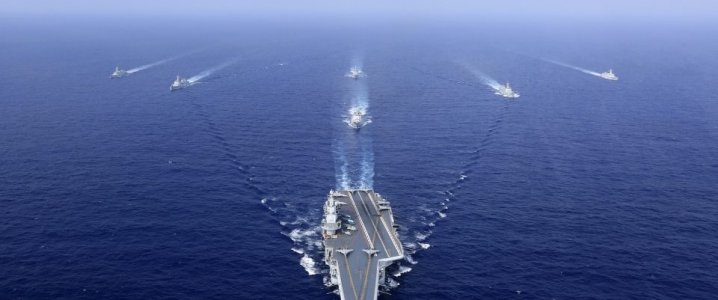It should come as no surprise that U.S. officials took China to task last weekend over its seemingly never-ending South China Sea build up.
Saturday at the annual Shangri-La Dialogue, a much covered and annual international security forum in Singapore, U.S. Defense Secretary James Mattis pulled no punches, stating that Beijing’s moves in the disputed body of water was intended to intimidate its neighbors.
The former Marine Corps four-star general, who served as the Commander of U.S. Central Command during the Obama Administration, said that the U.S. is willing to work with China on a "results-oriented" relationship, but Beijing's actions in the South China Sea call into question its intent and the Pentagon will "compete vigorously" if needed.
"Make no mistake: America is in the Indo-Pacific to stay. This is our priority theater," Mattis said. "We are aware China will face an array of challenges and opportunities in coming years, we are prepared to support China's choices if they promote long-term peace and prosperity for all in this dynamic region," he added. "Yet China's policy in the South China Sea stands in stark contrast to the openness our strategy promotes. It calls into question China's broader goals.”
Mattis’ remarks drew a stern rebuke from Chinese Lieutenant-General He Lei, deputy head of the Academy of Military Sciences of the People's Liberation Army (PLA) and leader of the Chinese delegation at this year’s Shangri-La Dialogue.
"It is those that are shouting about 'the militarization of the South China Sea' who are militarizing the South China Sea," the general said in a press conference later the same day. He also defended China’s actions as necessary on its own islands and reefs in the South China Sea in accordance with international law.
"Certain countries, under the guise of so-called 'freedom of navigation' and 'freedom of aviation,' have sent military vessels and aircraft to the waters and airspace near China's territory, even sailing within 12 nautical miles of Chinese waters. This has jeopardized China's security and challenged China's sovereignty," the general said. He added that freedom of navigation activities "are the true root of the militarization of the South China Sea." Related: OPEC’s Dilemma: Demand Destruction Or Production Boost
He Lei also reiterated that various islands in the South China Sea and their related waters are Chinese sacred territories acknowledged by history and international laws. According to some reports, the general even suggested that Shangri-La delegates visit Spratly island facilities to confirm their civilian nature for themselves instead of believing "rumors" about their militarization.
Hegemony and hydrocarbons
The war of words between the Washington and Beijing come just weeks after China installed long-range anti-ship cruise and anti-aircraft missiles on the Spratly Islands in the South China Sea. In 2015, however, Chinese President Xi Jinping pledged to not militarize islands in this body of water.
Tensions between the U.S. and China over the South China also comes just two weeks after fledgling U.S.-ally Vietnam had been coerced by Beijing to stop drilling for oil and gas within Vietnam’s own UN-mandated 200 nautical mile exclusive economic zone (EEZ). It marked the second time in less than a year that Vietnam had to suspend a major oil development in the South China Sea due to overt pressure from Beijing.
After Beijing’s recent victory over its smaller Southeast Asian neighbor and crucial trading partner, Chinese officials said that no other country would be able to drill within China’s own territorial waters.
The problem with that assertion is that Beijing agreed to and later signed the United Nations Convention on the Law of the Sea (UNCLOS), the international agreement that resulted from the third United Nations Conference on the Law of the Sea (UNCLOS III), which took place between 1973 and 1982. This agreement insures a country’s right to develop resources within its own 200-nautical mile (370 kilometers; 230 miles) EZZ, extending from its own baseline. Related: Why Oil Markets Should Fear Trump’s Trade War
Now, however, under the guide of historical ownership Beijing claims about 90 percent of the South China Sea. Vietnam, the Philippines, Taiwan, Brunei, Malaysia and Indonesia all have competing claims with China in the body of water. Of these rival claimants, Vietnam has been the most vocal and also one of the hardest hit.
The root of China’s South China Sea push, which has arguably been a PR disaster for Beijing not only with its smaller Asian neighbors, wiping out decades of attempts by Beijing to build trust in the region, but on the world stage as well, is not only about Chinese hegemony in the region, but control of South China Sea shipping lanes and oil and gas resources underneath its seabed.
ADVERTISEMENT
Moreover, trade estimated at nearly $4 trillion per year pass through the South China Sea, including crucial oil and liquefied natural gas (LNG) supplies to rival Japan, on-and-off-again friend South Korea and also Taiwan, which China, under Xi Jinping, has increased military operations in the Taiwan Strait as it seeks to intimate and drive a wedge between Washington and Taipei.
The United Nations Conference on Trade and Development (UNCTAD) estimates that roughly 80 percent of global trade by volume and around 70 percent by value is transported by sea. Of that volume, some 60 percent of maritime trade passes through Asia, with the South China Sea carrying an estimated one-third of total global shipping.
By Tim Daiss for Oilprice.com
More Top Reads From Oilprice.com:
- U.S. Asks OPEC To Boost Oil Production By 1 Million Bpd
- Oil Kingdom In Crisis: Saudi Royal Family Rift Turns Violent
- Iranian Crude Exports Rise Despite U.S. Sanctions


















